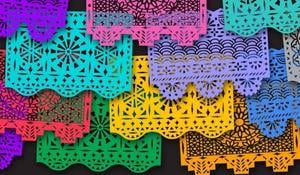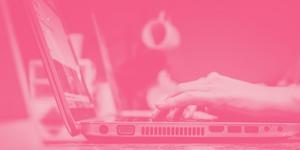This week, we have a guest post from a fellow Okay Human and co-founder of Clueful Phil Surles has expertly connected the concept of 'okay human' to the much-loved Hitchhiker's Guide to the Galaxy and shows why we need its messages now more than ever.
‘Okay Computer’
To many of us (especially the Gen Xers), this command evokes the title of Radiohead’s 1997 album that explored disillusionment with technology. The album's name was a direct quote from Douglas Adams' science fiction comedy, The Hitchhiker's Guide to the Galaxy, where a character says it just before requesting manual control of a spaceship.
Latterly, tech giants have borrowed the syntax to activate their devices. "OK Google" is the wake phrase for Google Assistant and Google Glass. And the military have long used it in the field to denote a state of readiness or wakefulness.
‘Okay Human’ takes this wake-state to a higher level.
When you think about the phrase, "Okay Human," it probably conveys a sense of reassurance—a reminder that it's okay to be human, with all our analog messiness in an increasingly digital world. It suggests acceptance of our imperfections and our need for meaning in an age of algorithmic efficiency. There's comfort in this reading because being human comes naturally to us. Or does it? Most of the 21st century has taken Douglas Adams’ wry warnings about the earnest deployment of technology (coupled with a farcical bureaucracy) and proved him right. In the process, our culture has made being human somewhat alien to many of us.
With this interpretation, "Okay Human" is more like a call to action—literal wake words. So how must we wake up humans and how will this help brands?
The Brand's Guide to Culture
The mantra of the Guide, "don't panic," is intended to reassure users as they face the unpredictability and absurdity of existence. This is particularly relevant today as the term "polycrisis" enters the lexicon of many behavioral researchers and strategists. It's more difficult than ever to predict cultural change, and harder for brands to avoid missteps. But for those who take culture seriously, there are more opportunities than ever to learn from it, leverage it, and even shape it. Just as the Guide's explorers learn how to navigate cosmic threats, brands can face culture confidently once they understand it. But even in the age of AI, there are no shortcuts. In fact, culture is more unpredictable than ever, so it's imperative that businesses use technologies like AI alongside insights from art and science to understand the human context that gives their brands meaning.
Whose Brand is it anyway?
"Okay Human" can mean different things simultaneously because of how we think. The nerdy word for this is polysemy, and it's why the phrase can encapsulate a core tension of the modern human experience. On one hand, it’s an acceptance of humanity's imperfection. On the other, it’s a call to action: acceptance and activation. We saw polysemy in action recently when Cracker Barrel set off a firestorm of controversy after a rebrand. What could have been a routine refresh became a cultural flashpoint. To some, the new branding was "woke." Others mocked this reaction and shared satirical backstories about the original branding on TikTok.
Brands mean different things to different people, and they are more politicized than ever. Today's brands must navigate not just different interpretations, but multiple realities as American society becomes increasingly fragmented. What makes sense to one audience can feel threatening to another, leaving brands caught between worldviews that seem like they no longer share common ground.
Retroactive Origin Stories
We may face existential challenges today that perhaps AI will exacerbate or solve, but the human is at the center of our story, so it makes sense to be inspired by The Hitchhiker’s Guide. Both stories are fundamentally about the same challenges of time, tech and humanity’s place. Both are navigating overwhelming complexity and gaining the context that makes AI useful.
Retroactive meaning-making is a common and powerful practice. Brands craft profound creation stories, weaving narratives that transcend brand positioning to achieve cultural relevance. This practice acknowledges that brands are more than commercial entities. They are cultural symbols that people invest with meaning. Reimagining what a brand could mean is a worthwhile habit, because its significance depends on its cultural context and can become profound in unexpected ways.
Asking the Right Questions
In the story, the answer to the ultimate question of life, the universe, and everything is revealed to be 42—an absurd response that highlights the limits of technology. Deep Thought, the most powerful computer ever built, can calculate for millions of years but can't produce a meaningful answer without its hyper-intelligent creators asking the right question.
Technology can also be worse than useless, especially when it allows users to create and validate their own realities at the expense of others. The erosion of trust in and engagement with institutions, from legacy media to science, is already causing us to lose our shared narratives and reference points. So while the human experience is defined by an ability to create alternate realities through culture, the innovations we associate with modernity are also making us more tribal and hubristic. The scale of and authority of Deep Thought (including the 7 million years to calculate the answer) produced a comedically supplicant audience, hanging on it’s every word. For me this conjures up the recent stock market wobble when Chinese ‘Deep Seek’ (sound familiar?) dropped their own authoritative mic on the world, claiming immediate dominion over us all. As humans we must harness technology but be very careful not to bow too low to it.
But here's the kicker: the technologies behind these innovations are also invaluable for addressing these very problems.
The Call to Action
Flipping the wake phrase on ourselves is a call to stay human in a world where it's increasingly difficult to remember humanity, both our own and each other's. It's a call for social innovation, an invitation to develop our capacity to ask more meaningful questions by gaining better context. And it's a call for humans to be as advanced as the technologies we create, maintaining our humanity as the stakes get higher. The Hitchhiker's Guide reveals the limitations of technology when users fall short and the problem with expecting meaningful answers from machines without doing the work of understanding our own questions. Ultimately, "Okay Human" is our reminder that the future belongs to those who learn how to navigate uncertainty and that even the most powerful technologies are only as useful as their users.


